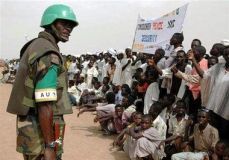Darfuris say losing hope of peace, want UN help
April 25, 2007 (EL-GENEINA) — In Darfur’s Krinding Camp, home to more than 30,000 displaced people, Jomaa Zakaria says hopes for a decent life without fear for his children’s lives from Arab militiamen are diminishing daily.
 “The world does not look at us as human beings,” the 38-year-old father of seven said.
“The world does not look at us as human beings,” the 38-year-old father of seven said.
He said a recent agreement between Sudan and the United Nations to deploy some 3,500 U.N. military personnel to support the overstretched African Union force in Darfur has failed to lift the gloom at the camp.
“Those 3,000 cannot secure Darfur. We need 20,000 or 25,000 people,” he said. Sudan has rejected such a force and says it will not bow to “Western blackmail”.
The United Nations say around 200,000 people have been killed in the vast Western region of Darfur since 2003 when rebel groups took up arms against the government, accusing it of neglect. Sudan says only 9,000 have perished.
Zakaria and other leaders of the displaced people pleaded for help from Antonio Guterres, the head of the U.N. refugee agency, at a meeting in a small hut at the camp on Tuesday.
They said armed Arab militiamen known as Janjaweed, blamed for many atrocities in Darfur, frequently attack the camp with impunity.
“The Janjaweed control everything,” said Ibrahim Mohamed Adam, sitting on a straw mat. “I can’t go out after sunset. Why should our children suffer?” he said.
Another leader, Ibrahim Ali, said: “The Janjaweed could follow a man to his home, and if they find he has a valuable apparatus like a mobile phone, they would kill him and take it.”
“No one chases or arrests and attackers. We want U.N. forces,” he said.
Human rights groups say the Sudanese government armed the Janjaweed to help quell the rebellion which erupted in 2003. Khartoum denies the charge, saying the Janjaweed are bandits.
AID AGENCIES WITHDRAW
Residents of El-Geneina, capital of the West Darfur state, say the Janjaweed — a term derived loosely from the Arabic for “devils on horseback” — roam the town freely in the evening.
After dark on Tuesday, two men on horseback toured the quiet sandy streets of the town near a U.N. building. A pick-up truck with a mounted machinegun roared past Guterres’s motorcade.
Residents say such vehicles, usually without licence plates, belong to the Janjaweed.
Guterres arrived in Darfur the day after several aid agencies pulled out of the town of Um Dukhun because of worsening security in the area, which lies in West Darfur state near the border with Chad.
The agencies, which include Britain’s Oxfam and Save the Children Spain, said their decision would disrupt services to around 100,000 people in the town and surrounding rural areas.
Guterres told camp leaders that only a political solution, not any large peacekeeping force, would bring peace to Darfur.
He told them the situation in Darfur has become a wider conflict involving militias, rebels and bandits. To Zakaria, however, those words rang hollow.
“We have listened to the same words over and over. There is no hope,” he said. “If the situation here does not improve, I will ask to be moved to another country.”
Guterres later visited a children’s centre, where boys and girls were drawing and performing traditional Sudanese dances.
One girl painted colourful flowers on her white paper. Another boy, however, drew a pick-up truck with a mounted machinegun. “Tell him the flower is good, the gun is bad,” Guterres told an aid worker with a smile.
(Reuters)
